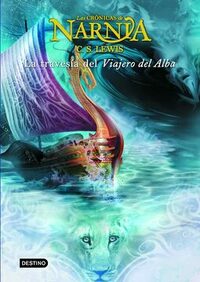You need to sign in or sign up before continuing.
Take a photo of a barcode or cover
adventurous
funny
lighthearted
fast-paced
Plot or Character Driven:
Plot
Strong character development:
Yes
Loveable characters:
Yes
Diverse cast of characters:
No
Flaws of characters a main focus:
Complicated
adventurous
funny
hopeful
lighthearted
mysterious
slow-paced
Plot or Character Driven:
A mix
Strong character development:
Yes
Loveable characters:
Yes
Diverse cast of characters:
Yes
Flaws of characters a main focus:
Complicated
The Voyage of the Dawn Treader is one of the more adventurous and episodic installments in The Chronicles of Narnia, following King Caspian’s journey across uncharted seas in search of the seven lost lords of Narnia. This time, the Pevensie siblings are absent (except for Edmund and Lucy), and instead, we are introduced to their insufferable cousin, Eustace Scrubb—who, as Lewis famously quips, “almost deserved” his name.
The novel follows Caspian, Edmund, Lucy, Eustace, and the valiant mouse Reepicheep as they sail aboard the Dawn Treader, encountering enchanted islands, cursed waters, and mysterious beings. Each stop on their journey presents a new trial, whether it’s greed and corruption (as seen in Eustace’s transformation into a dragon), the temptation of power (Lucy’s struggle with vanity and magic), or the creeping fear of the unknown (the terrifying Dark Island). As the story unfolds, Eustace undergoes one of the most compelling arcs in the series, transformed not just physically but spiritually through an encounter with Aslan.
One of the strengths of The Voyage of the Dawn Treader is its sense of wonder and discovery. Unlike previous books, which were grounded in political conflict or grand battles, this novel leans into mythic exploration, making it feel more like a classic sea voyage tale. The variety of encounters keeps the narrative engaging, and Lewis’s imagination is on full display, particularly in the final chapters where they sail to the very edges of the world, culminating in Reepicheep’s fateful decision to journey beyond to Aslan’s country.
While this book contains fewer of the problematic elements that mar earlier Narnia stories—particularly in the portrayal of other cultures and women—there are still a few moments where girls or women are disparaged. These moments aren’t as central to the narrative as, say, Susan’s arc in The Last Battle, but they are still worth noting in a broader critique of Lewis’s treatment of gender.
Ultimately, The Voyage of the Dawn Treader stands out for its spiritual themes, particularly in Eustace’s redemption and the book’s meditative, almost mystical ending. The journey to the edge of the world is a fitting metaphor for both personal transformation and the pursuit of deeper truth. While it lacks the cohesive narrative drive of The Lion, the Witch and the Wardrobe, it remains one of the most imaginative and thematically rich books in the series.
The novel follows Caspian, Edmund, Lucy, Eustace, and the valiant mouse Reepicheep as they sail aboard the Dawn Treader, encountering enchanted islands, cursed waters, and mysterious beings. Each stop on their journey presents a new trial, whether it’s greed and corruption (as seen in Eustace’s transformation into a dragon), the temptation of power (Lucy’s struggle with vanity and magic), or the creeping fear of the unknown (the terrifying Dark Island). As the story unfolds, Eustace undergoes one of the most compelling arcs in the series, transformed not just physically but spiritually through an encounter with Aslan.
One of the strengths of The Voyage of the Dawn Treader is its sense of wonder and discovery. Unlike previous books, which were grounded in political conflict or grand battles, this novel leans into mythic exploration, making it feel more like a classic sea voyage tale. The variety of encounters keeps the narrative engaging, and Lewis’s imagination is on full display, particularly in the final chapters where they sail to the very edges of the world, culminating in Reepicheep’s fateful decision to journey beyond to Aslan’s country.
While this book contains fewer of the problematic elements that mar earlier Narnia stories—particularly in the portrayal of other cultures and women—there are still a few moments where girls or women are disparaged. These moments aren’t as central to the narrative as, say, Susan’s arc in The Last Battle, but they are still worth noting in a broader critique of Lewis’s treatment of gender.
Ultimately, The Voyage of the Dawn Treader stands out for its spiritual themes, particularly in Eustace’s redemption and the book’s meditative, almost mystical ending. The journey to the edge of the world is a fitting metaphor for both personal transformation and the pursuit of deeper truth. While it lacks the cohesive narrative drive of The Lion, the Witch and the Wardrobe, it remains one of the most imaginative and thematically rich books in the series.
There are some deeply problematic things in this book. Slavery and sexism are the most obvious. Aslan is still a deeply moving character.
adventurous
mysterious
reflective
medium-paced
Plot or Character Driven:
A mix
Strong character development:
Yes
Loveable characters:
Yes
Diverse cast of characters:
Yes
Flaws of characters a main focus:
Yes
adventurous
fast-paced
Plot or Character Driven:
A mix
Strong character development:
Yes
Loveable characters:
Yes
Diverse cast of characters:
Yes
Flaws of characters a main focus:
Yes
adventurous
mysterious
Perhaps I didn't like this one as much because none of it was set in actual Narnia--they were voyaging to the end of the world, experiencing strange and unknown places.
Although obviously this was written first, it kept reminding me of the Pirates of the Caribbean movie where the crew is on the Black Pearl trying to get back to the Land of the living: just the fact of being on a ship, seeing odd things. Some of the things the characters saw and experienced in this book were odd and/or had no explanation behind them. Maybe I'm missing out on some underlying allegorical elements though. The ending also seemed kind of abrupt to me.
I liked seeing Eustaces' character growth; the journal entries helped to understand his thinking better. He was kind of funny to me although he didn't mean to be.
Content: a magician with a spellbook (didn't bother me since the spells aren't quite what they appear at first), 3 uses of "ass" one of which was in reference to a donkey
Christian faith rating: 1/3
Although obviously this was written first, it kept reminding me of the Pirates of the Caribbean movie where the crew is on the Black Pearl trying to get back to the Land of the living: just the fact of being on a ship, seeing odd things. Some of the things the characters saw and experienced in this book were odd and/or had no explanation behind them. Maybe I'm missing out on some underlying allegorical elements though. The ending also seemed kind of abrupt to me.
I liked seeing Eustaces' character growth; the journal entries helped to understand his thinking better. He was kind of funny to me although he didn't mean to be.
Content: a magician with a spellbook (didn't bother me since the spells aren't quite what they appear at first), 3 uses of "ass" one of which was in reference to a donkey
Christian faith rating: 1/3
adventurous
emotional
funny
mysterious
adventurous
inspiring
medium-paced
Plot or Character Driven:
Plot
This is one of my favorite books in the series. I just love Reepicheep! I especially like that we get to learn about the world outside of Narnia.
My favorite of the entire series! So much adventure and fun!





